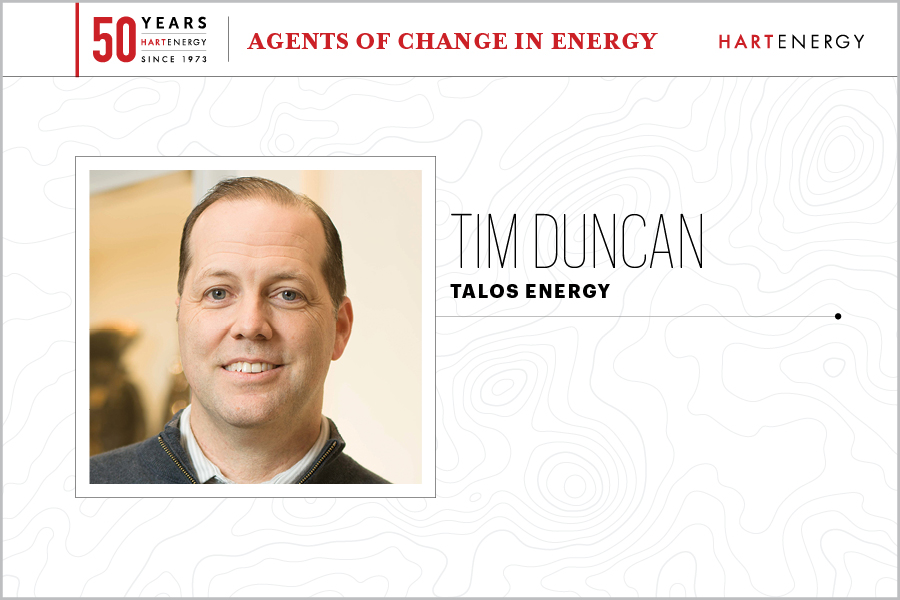Tim Duncan
Editor's note: This profile is part of Hart Energy's 50th anniversary Hall of Fame series honoring industry pioneers of the past 50 years and the Agents of Change (ACEs) who are leading the energy sector into the future.

Born in New Orleans where his father worked for Amoco, Tim Duncan grew up in the offshore sector and moved around the world, but he never took his aim off of the Gulf of Mexico.
After working his way up through Zilkha Energy and other Gulf startups that were sold, Duncan co-founded Talos in 2012—before turning 40—with an offshore focus when the rest of the industry was pivoting to the emerging tight oil boom onshore.
“We’ve never given up on the idea that offshore is important and it’s relevant and it’s part of the broader energy mix,” Duncan said in an interview with Hart Energy. “We’ve stayed here where others have pivoted. We’re a throwback.”
Talos may seem old-fashioned in that way, but Duncan’s company also has proven to be a pioneer in both offshore Mexico discoveries and in U.S. carbon capture and storage in the Gulf.
For several years, Talos has grown in the U.S. Gulf, including its recent purchase of EnVen Energy for $1.1 billion. The company went public in 2017 by entering into a reverse merger with Stone Energy.
Duncan’s strategy of wanting to stay nimble and take smart risks led Talos into the newly opened offshore Mexico market, making the potentially groundbreaking Zama discovery in 2017.
“It was about taking what we’re good at and trying to lean into something different,” Duncan said. “If we were successful, then we could differentiate ourselves.”
They proved the success, but politics intervened when the next Mexican president handed more control of the project to state-owned Pemex.
In September, Talos sold a 49.9% of its Mexico stake to Grupo Carso, making Mexican billionaire Carlos Slim one of Talos’s top investors.
Carbon-minded
Just over two years ago, Talos took another strategic leap of faith and started picking up acreage both onshore and off with the mindset of injecting—not extracting—carbon.
A slew of developing CCS projects were born from that move: the flagship Bayou Bend CCS offshore Port Arthur, Texas; River Bend CCS in Louisiana; Coastal Bend CCS near Corpus Christi, Texas; and a point-source project with Freeport LNG in Texas.
As potential pioneers in offshore CCS with Bayou Bend, Talos and partner Carbonvert found themselves in the enviable position of being approached by Chevron to join the team. Chevron came onboard last year as a 50% project owner and, in March, the expanded team added to Bayou Bend’s 40,000 offshore acres with 100,000 onshore acres between Houston and Port Arthur.
“By decarbonizing, we’re going to try to extend the life of oil and gas,” Duncan said. “We got ahead of that very, very early, and we showed some leadership.”
In the U.S. Gulf, a larger Talos is partnering more and more on discoveries with the majors that rule the deep waters, such as Chevron, BP and Shell.
Next, Talos will continue to grow in the Gulf, but Duncan said he has his eyes on global offshore expansion, whether in Latin or South America, West Africa or beyond.
“We need to be a lot bigger now that we’re public,” Duncan said. “We’re going to be a very diversified, global E&P company five to seven years from now.”
—Jordan Blum, editorial director
